Michael Laub / Remote Control Productions
Total Masala Slammer
– Heartbreak No 5 (2001)
PHOTOGRAPHY / VIDEO / CREDITS / PRESS
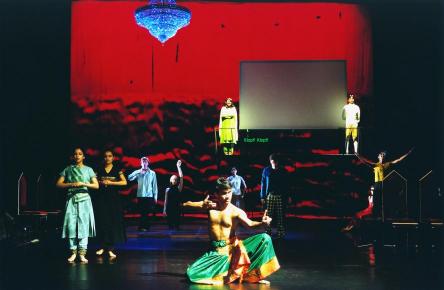
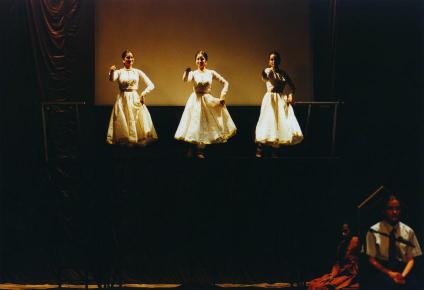
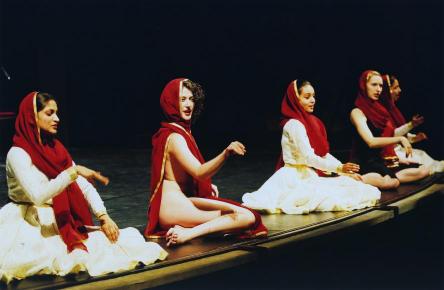
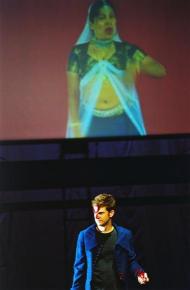
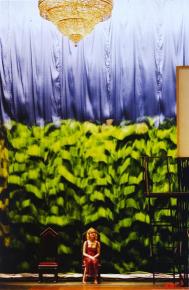
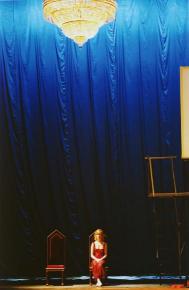
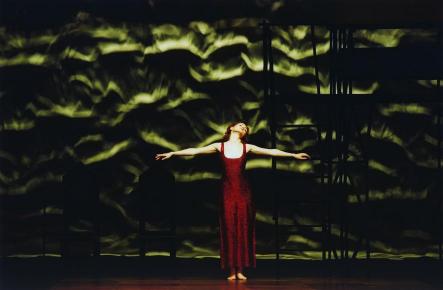
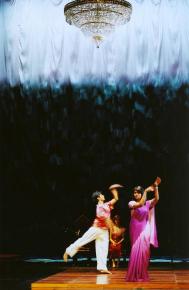
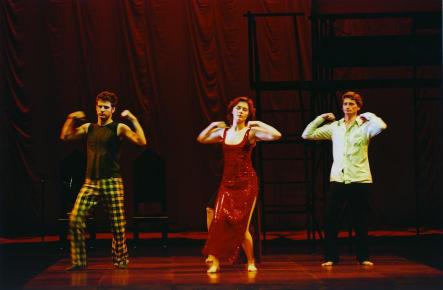
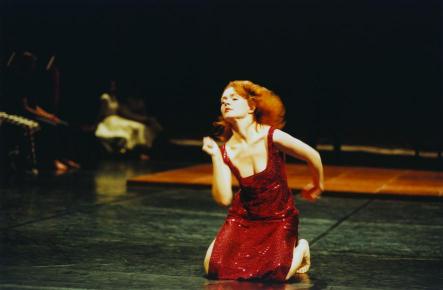
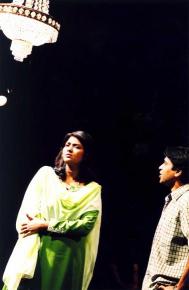
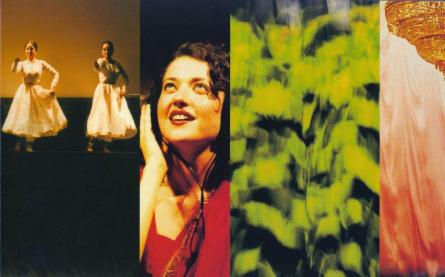
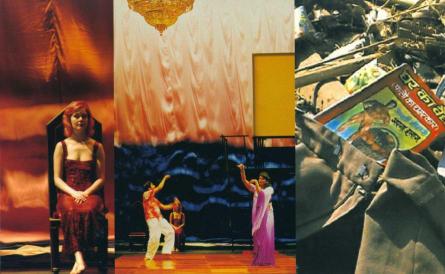
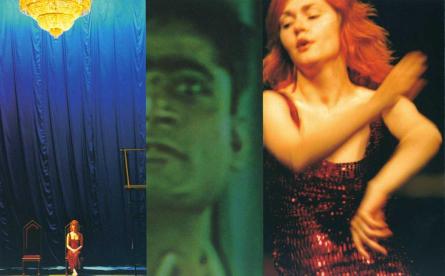
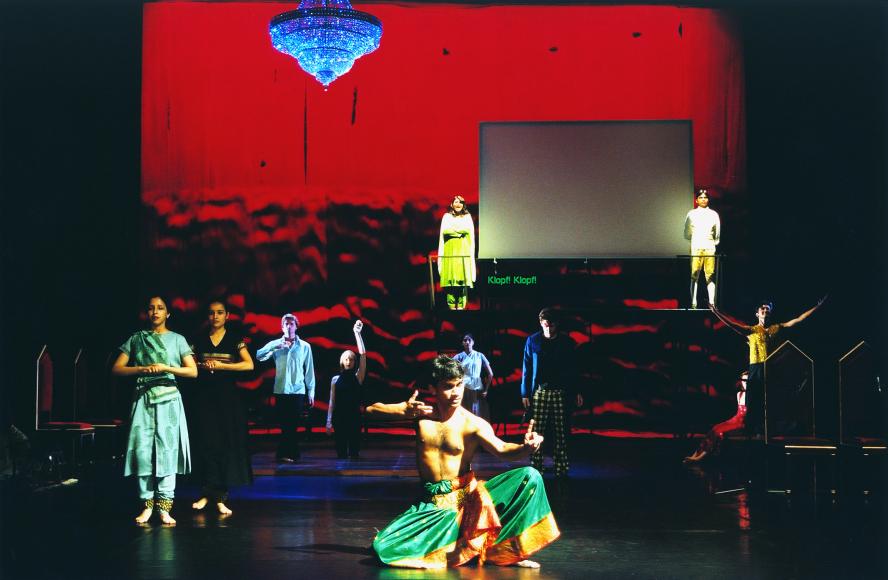
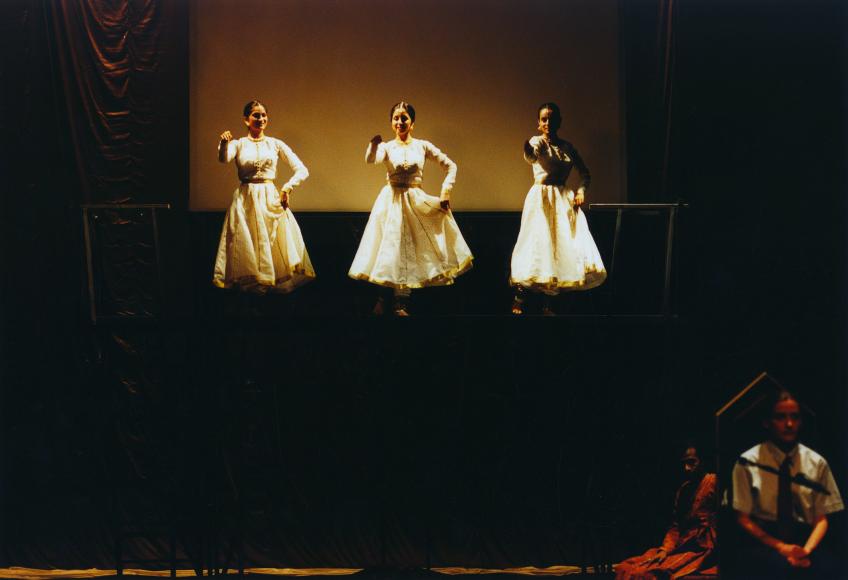
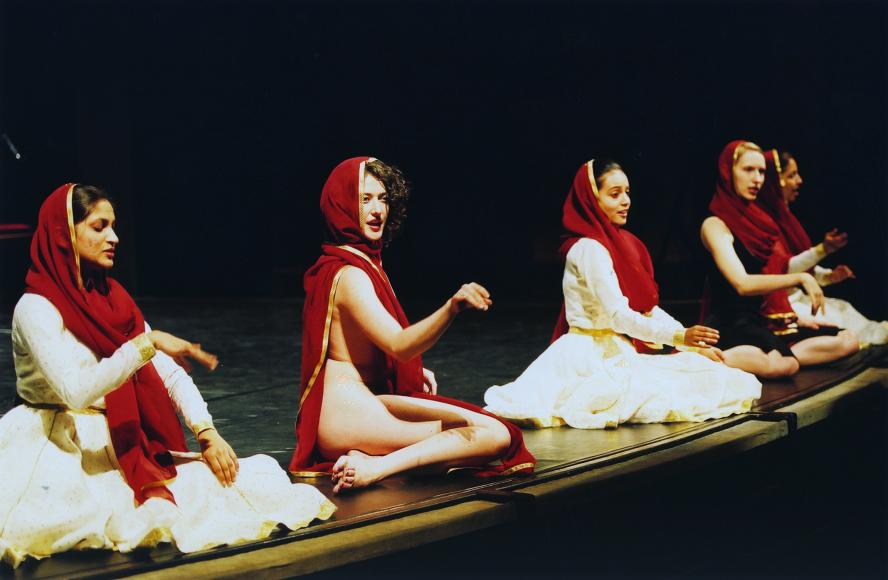
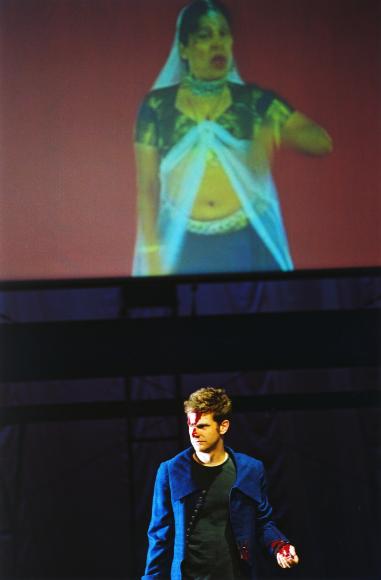
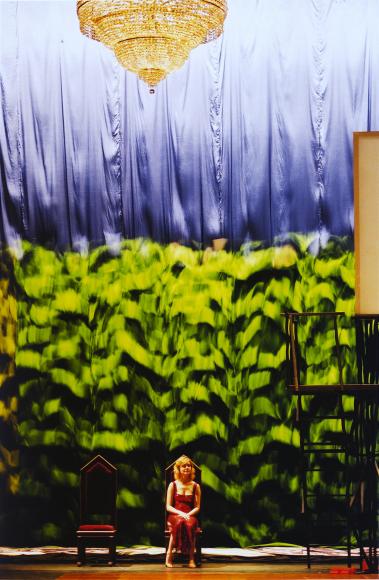
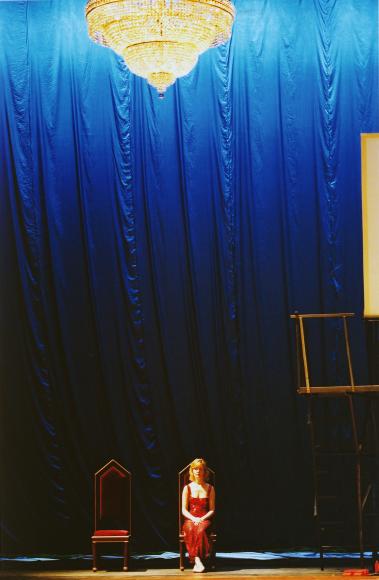
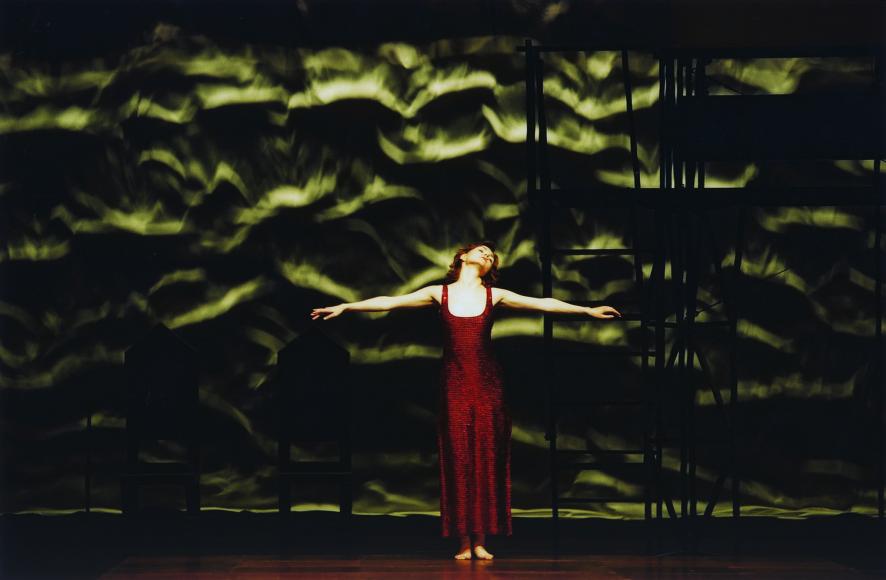
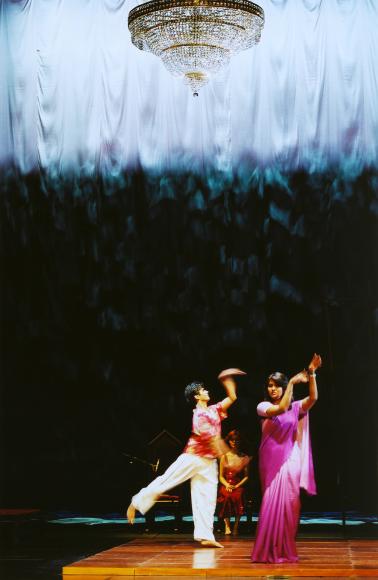
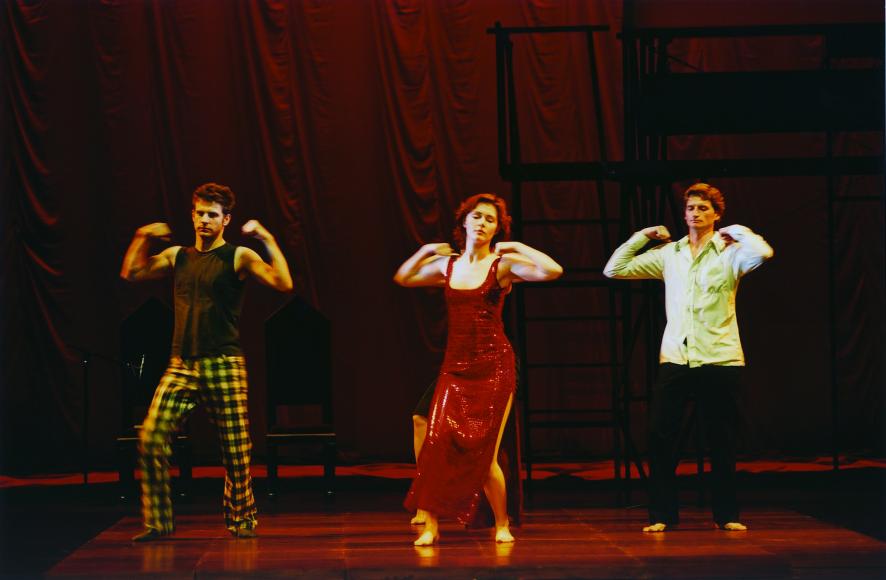
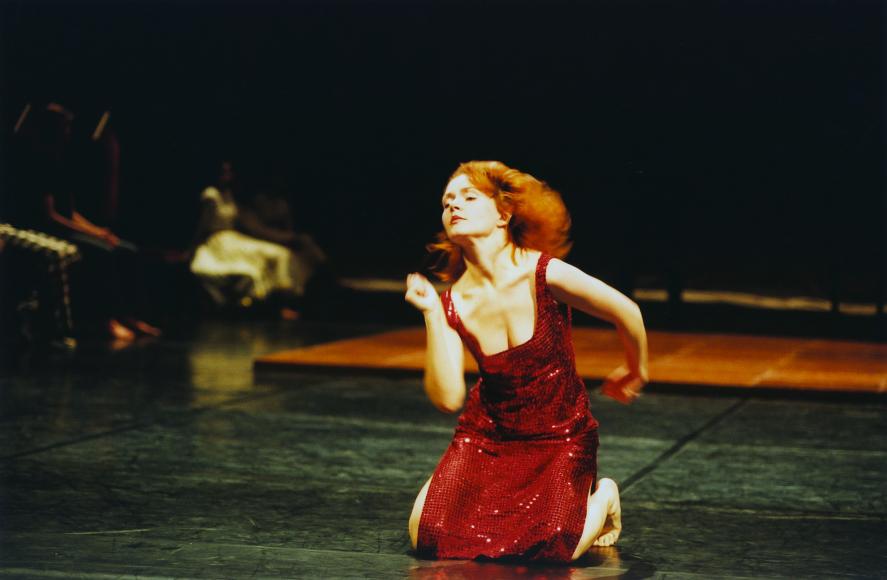
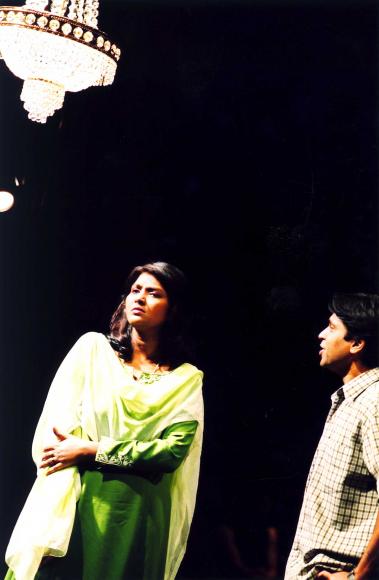
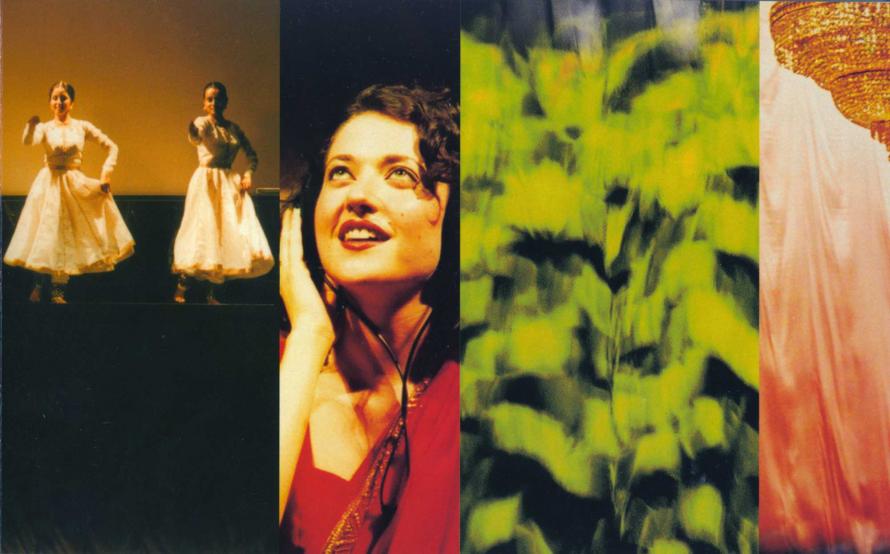
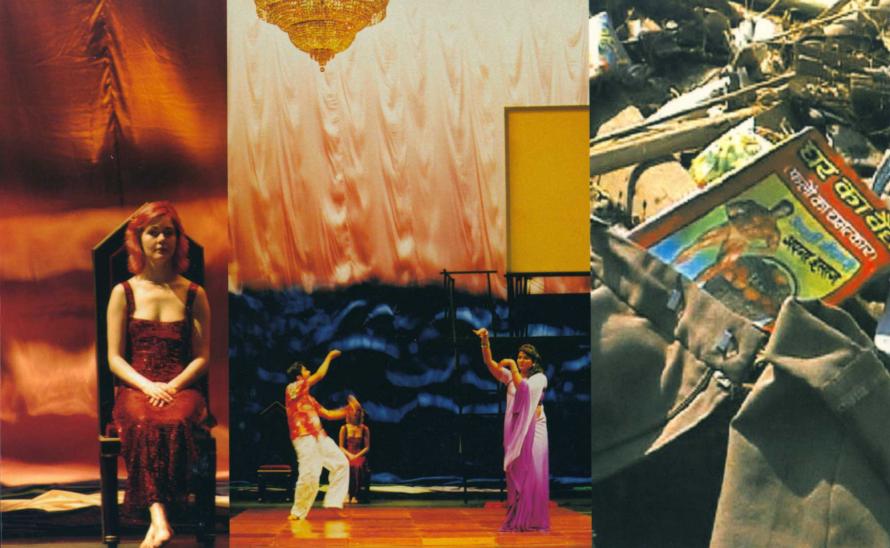
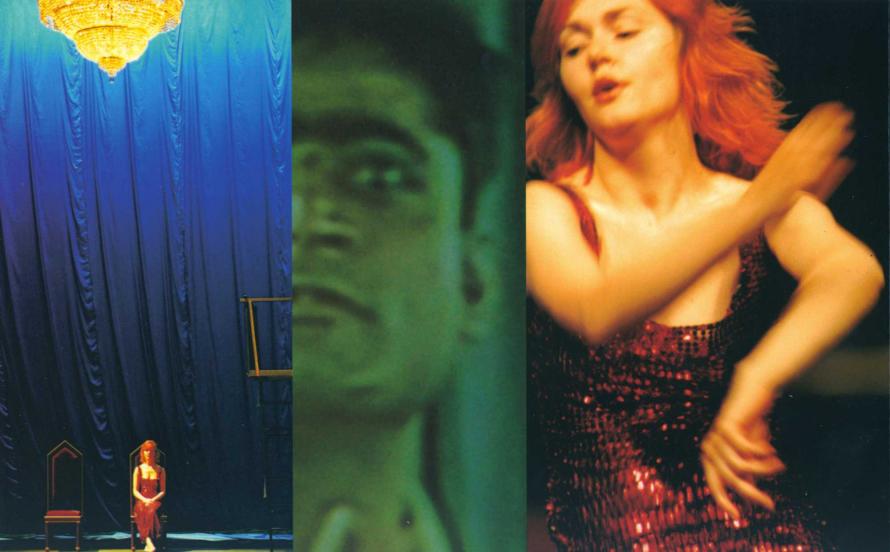
"I have been told that a noble breed of horses, when overheated and hunted almost to death, will by instinct bite open a vein and so recover their breath. I often feel the same. I should like to open one of my veins and gain eternal freedom for myself." (Goethe)
"I no more love you." (Anuskaa)
CREDITS
Conceived and directed by Michael Laub
Music Larry Steinbachek, Atul Desai, Sunayana Hazarilal,
Light Nigel Edwards
Choreography Dennis O'Connor, Sunayana Hazarilal, Kumudini Lakhia, Michael Laub and company
Text Michael Laub, the company and excerpts from J.W. Goethe „Die Leiden des jungen Werther“
Soap Opera Sript Anju Makhija, Kavita Murker
Set Design Jean Baptiste Trystram, Michael Laub, Paresh Daru
Costumes Bhanu Athaiya, Kris Kremberg
Kathak Costumes Sunayana Hazarilal,
Costumes Coordination Eva Maria Helfrich
Artistic Consultant India Amrit Gangar
Sound Jean Pierre Urbano , Michael Laub
Video:
Digital Camera Marina Abramovic
Digital Camera Eva Maria Helfrich
Betacam Camera K.K.Mahajan, Arun Sharma
Technical Director Jochen Massar
Video technician
Dietmar Fleischer
Assistant to Production Eva Maria Helfrich
Assistant Director and Executive Preproduction Mumbai Claudine Profitlich
Artistic Consultant Marina Abramovic
With Ashok Balakrishnan, Lara Benusis, Shrutee Butle, Priti Chaudhary, Richa Chinoy, Anuskaa Datur, Astrid Endruweit, Hildigunn Eydfinsdottir, Biru Bireshwar Gautam, Pradeesh Kizhakkan, Dennis O’Connor, Vinay Peshave, Aparna Sharma, Stephanie Weyman, Greg Zuccolo and Nakul Mishra (Tabla Player)
Executive Producer Maria Magdalena Schwaegermann
Tour Management Elisabeth Knauf
Executive Producer USA Renata Petroni, Two Moon, New York
Co-Production Hebbel-Theater, Berlin – Rotterdamse Schouwburg – Arts International,
New York - Zuercher Theaterspektakel – Szene Salzburg – Remote Control Productions, Tilburg.
Supported by Fonds voor de Podiumskunsten, Den Haag, Hauptstadtkulturfonds der
Bundesrepublik Deutschland, Auswärtiges Amt, Goethe Institut Internationales e.V.,
European Commission, Culture 2000
Thanks to National Center of Performing Arts Mumbai, Goethe Institut Mumbai,
Consulate General of the Federal republic of Germany, Mumbai.
PRESS
Mirjam van der Linden, Volkskrant, 03.09.2001
(...) Total Masala Slammer is such a cocktail of disciplines, styles and cultures. There is one thing Laub wants to avoid: that the audience might lean back lazily into some idle illusion. The actors are exquisite without exception and master perfectly Laub`s language of switching between being personal or distanced.
Initially Laub`s method seems to be too obvious to keep up the tension. But while the parting lines of his mosaic become increasingly vaguer a fascinating and heartfelt statement about difference and semblance arises.
All love affairs in Total Masala Slammer fail. Be they art or not, be they spoken in candy sweet American English, stiff Indian English or impeccable German, as in the translation of the whore in the disguise of the most obedient girl in the class. How differently does this Goethe reach us when it is not reeled off but rather read as a gripping novel. It is masterly how Laub registers, respects and relativizes all at the same time.
Volkskrant, 3. September 2001
For him, there's nothing to beat being foreign – in one's own body, in a role, in a culture. For Michael Laub's new piece Total Masala Slammer, the director and choreographer of Remote Control Productions travelled to India in search of Indian artists to assist him with the dance, text and music. His task was not simple, for many masters feared the authenticity of their traditional arts would be impaired. Yet the risk paid off. The result is a celebration of the hybrid, the kind of mixture of mockery, ebullience and tenderness that previously we knew only from novels like those of Salman Rushdie or the young British writer Sadie Smith. Never before has India been so sexy or the stage-version of love so funny as they are in Total Masala Slammer, whose premiere in the Hebbel-Theater opened this year's Tanz im August festival in Berlin.
Katrin Bettina.Müller, die tageszeitung, 13.August 2001
Eva Elisabeth Fischer, Süddeutsche Zeitung, 13.08.2001
(…) This is theatre that the musicians, dancers and actors obviously enjoy as much as the audience. No skimping on emotions or outbreaks or displays of multifarious artistic skills – that's the way 16 performers from the USA, from India, from Iceland and Berlin acted, sung and dancee Total Masala Slammer as the opening of Berlin’s international summer festival ‘Tanz im August’.
At the Podewil in Berlin last year, director Michael Laub put on stage the eccentric Astrid Endruweit with a solo performance in which she was a saintly whore. She's back this year at the Hebbel-Theater, now in the guise of an austere waif dressed in a school uniform, a sad male fantasy who lets people spank her bottom for money. In the two hours leading up to this wretched scene, however, there is much human frailty and cultural misunderstandings to chuckle over. And there's lots to gape at too, because Michael Laub is probably the only contemporary director and choreographer who manages to have everyone on his stage looking not just good, but sexy as well.
Condensed-milk-creamy skin
Great is the sensual pleasure afforded to the audience when the colourful silk sheets at the back of the set go rippling down to the floor like glistening torrents of water for every scene change. And the male and female jazz dancers who slowly and lewdly gyrate their hips and stretch their legs in accordance with Dennis O'Connor's choreography are a feast for the eyes. The same is true of the kathak-dancing Indian women; they stamp the floor, their ankle bells jangling with rhythmical precision, and stretch out their arms and fingers with equal accuracy, tilting their shoulders and heads at the same time. And equally true of another scenario: all the women, Indian and the other nationalities, are up there on the ramp going through the basic motions of kathak.
(…) Michael laub spent many of the past 18 months in Bombay, and took back the things that fascinated him – on the street, on TV, and not least during the endless auditions where he laboriously found the perfect player for every part. Now he shows his findings ion a compulsively funny piece that, with sneaky naivety, throws up questions about cultural identity.
Gerald Siegmund, Frankfurter Allgemeine Zeitung, 13.08.2001
Total Masala Slammer/Heartbreak No. 5, whose premiere in Berlin's Hebbel-Theater opened the international 'Tanz im August' dance festival, is an attempt to transfer to the stage the structural principles of a non-theatre genre. Enticed by outsized emotions, by colour and by the evocative kathak dance of Northern India which rhythmically structures events on both the screen and stage, Total Masala Slammer is a successful theatrical representation of a Bollywood film. The piece is not unlike the 'Alabama Slammer' cocktail described in the first half by dancer Dennis O'Connor, who also devised the simple yet effective choreography. Mix whiskey, Southern Comfort and gin with a dash of lemon juice, and give the mixture a good stir. Laub's production is a similar mixture of ingredients that at first glance seem incompatible; the result is stunning and touching in equal measure.
(…)Laub's piece uninhibitedly surrenders to the triviality of the culture industry and its products, yet is itself anything but trivial. Always working on several levels at once, Laub artfully intermeshes these planes without the audience being able to immediately recognize the connections. While in the first half the various strands dangle fairly loosely, in the second half the director increasingly tightens the knot. Every appearance, more often than not ending on the ramp, is demonstratively presented as a staged scene. Effortlessly citing the clichés of different genres, Laub lets his performers slip in and out of roles with equal ease. The permanently shifting framework makes the mini-scenes both reflect into and rebound off each other, thus consistently disallowing the faintest hint of illusion. The interspaces are also breathing spaces for the production and the performers. If in earlier productions Laub's collage technique often led to a certain glibness, in Total Masala Slammer the technique accomplishes richly faceted changeovers between figure and persona in which the outstanding dancer-actors are wholly immersed in the momentum of a particular situation.
The comedy of the utterly zestful production is due not least to the permanent translations of text, languages, accents, emotions and, ultimately, those cultural traditions that meet up on the stage. With his very sharp ear for tones and hues, Laub has O'Connor talk in a broad deep-south accent, makes Stephanie Weyman put on a walkman and talk English with an Indian lilt until she makes way for the three kathak dancers Anar Shah, Shrutee Butle and Richa Chinoy with their rhythmic and syllabic singsong. When the actor playing Subhankar is writhing with pain after Nandhita has yet again rebuffed his advances, a dancer pushes him aside and proceeds to express grief and pain with the strictly coordinated hand motions and physical postures of kathak. That's all seriously funny, and it's earnest too.
By the end, the round of broken hearts builds up into a melodrama. As the catastrophe approaches, Lotte's singing becomes more shrill. Greg Zuccolo puts a bullet through his head. Vinay Peshave and Anuskaa Dantur, playing the figures of Subhankar and Nandhita, take up positions on the platform next to the screen and repeat their first dialogue, while behind them the exquisite curtains that until then covered the back of the stage drop consecutively. It is a scene of hopelessness ending in a bare firewall blocking off every perspective. Yet Total Masala Slammer is anything but despairing. Mutual curiosity, along with respect for the foreignness of the others, is what characterizes Michael Laub's dance-theatre piece.
The utopian aspect of the evening lies not in its tragic content, but in its form. The visible pleasure the dancers, performers and tabla player Nakul Mishra took in each other was infectious, and the audience responded with thunderous applause.
Shanta Gokhale, Sunday Times of India, 17.03.2002
TOTAL Masala Slammer, a video screening of the dance theatre production of the same name, slammed into our sensibilities at the Little Theatre on March 6. Directed by Belgian director Michael Laub, who was present at the screening, the production is a carefully orchestrated hotch-potch of dance, music and theatre, organized around the theme of heart-break.
We are told that Laub fell for the seductions of Bollywood while watching one of its products in a Sri Lankan hotel. Thereafter he must have marinated himself quite completely in its masala, to have emerged not as one of those patronizing westerners who find Indian kitsch ‘interesting’ but as a genuine admirer. He finds Bollywood’s approach to film-making ‘post-modernist’! As proof of good faith, he juxtaposes the Bollywood elements in his production alongside passages from Goethe’s opera, The Sorrows of Young Werther, ironising both for their high-voltage emotionalism, but also infecting us with his own joy in them.
Speaking about his theatre, Laub pointed out that it straddled the two extremes of realism and stylization. In Total Masala Slammer, he had wished to use Bollywood dance along with its fights and drama, but soon discovered that such an animal didn’t exist outside of the ministrations of cameraman and editor. Meanwhile, however, he had seen kathak and smitten by it. A dance in which the dancer could casually tuck her hair behind her ear as she danced was right up his ‘deconstructive’ street.
So into the emotional highs of Bollywood and opera (occasionally bordering on the hysterical), the arias, alaaps and thumris, deadpan and virtuoso performances (some of them cross-cultural), Laub injects the energy and classical rigour of kathak. And amazingly, all the disparate elements blend together as happily and headily as bhelpuri.
Christiana Kühl, Kultur Spiegel, August 2001
Michael Laub was stranded on Sri Lanka, and did what travellers obliged to hang about usually do – he watched television, even at three in the morning, and suddenly he noticed that the electronic fodder had become very colourful indeed. There were people dancing in front of a mountain backdrop, people singing, endless dialogues, scenes hinting at rape, chaotic flashbacks. A film akin to a fever delirium, in fact: emotional and trivial, tragic and excessive. „I watched those shifting levels,“ recalls Laub, „the leaps from genre to genre, and suddenly I thought: hang on, that’s the way I work too.“ There, on Sri Lanka, he was first gripped by Bollywood fever.
The Belgian director Michael Laub has been producing theatrical works of the unconventional variety for a full quarter-century. After founding the Maniac Productions group in Stockholm in 1975, he took charge of Remote Control Productions in 1981. His guiding principle: depth comes about purely through chance.
His inspiration has come less from the standard works of high art than from Andy Warhol’s concept of the serial, William S. Burrough’s cut-up technique, free jazz and the bold visual worlds of the big screen. All the same, Laub’s work is as remote from plagiarism as Brussels is from Bombay, due to the private elements he unfailingly and fragmentarily introduces into his citations of the Pop myth.
A fresh bout of Bollywood fever has befallen the director. Together with a 14-strong multinational ensemble of dancers, musicians and actors, Laub is in Berlin for the world premiere of Total Masala Slammer / Heartbreak No 5. This latest project was inspired by the delirious stream of images he saw that night on Sri Lankan television. Not unlike an Indian spice mixture, his piece brings together very dissimilar ingredients: classical Indian dance and modern ballet, Goethe’s The Sorrows of Young Werther and set pieces from soaps and biographical texts, tabla rhythms and the sound of drum ‚n’ bass. As deliriums go, it’s pretty cool.
„We’re gonna sing and read a little of this tonight,“ announces the American performer Greg Zuccolo as an opener, and reads aloud from the classic work of the Storm and Stress movement, amusedly waving about his copy of Werther. Astrid Endruweit, his Berlin-based co-performer, translates simultaneously and solemnly. Chandeliers descend from the top of the stage, a curtain falls, a sighing couple who looks like they were transplanted from a TV series intone, „I don’t love you anymore.“ – „I love you.“ – „Go away.“ Behind them, three Indian women dance the Kathak, concentrating intensely. Werther’s Lotte can hardly have been more seductive or untouchable. Heartbreak knows no borders – that much became clear while watching this rehearsal.
The „Masala“ concept is to be found in the „Natyasastra“, the ancient Indian book of theatrical art that specifies nine „flavours“: romance, comedy, tragedy, rage, heroic, courage, fear, obscenity, revulsion, composure – and all in one play, at that. Even the contemporary fairy tales churned out by Bombay’s dream factory – annual production of some 1,000 films make it the world’s largest – are produced according to the same recipe. Three-hour-long melodramas shot in spectacular locations, backed by gooey (and carefully marketed) pop songs whose sales subsidize the films. „Here, everybody constantly sings, hums and warbles wherever they happen to be,“ explains the film critic Amrit Gangar, who helped Laub find dancers and a camera crew for the „Masala“ project in India. „These songs are what holds India together – alongside cricket and poverty.“
While every Indian may dispose over a vast repertory of songs, the stories told by Bollywood can be reduced to a single episode, namely the one from the „Ramayana“ epic in which the god Krishna realizes he is in love with a milkmaid. Nudity, or even physical contact, is taboo. When lovers kiss in a Bollywood film, the screen shows two flowers shyly bending towards each other. Sex scenes? A newly betrothed couple boards the night train. A sari slips from the bride’s shoulder. Cut to a full moon. Cut to pistons rhythmically pushing against each other. Full moon. The pistons continue to gain momentum – until, with a screech, the locomotive gives off steam.
For a long time, the western world wrote off as kitsch the Bollywood films. Things have changed: MTV Europe now borrows Bollywood’s colourful non-linear presentation forms, and even Andrew Lloyd Webber is working on a project titled „Bombay Dreams“. His new musical is schedules to open in London next spring in a former cinema seating 4,000 and with standing room for as many again.
Accompanied by the Performance artist Marina Abramovic, Laub began preparing Masala on a trip to Bombay in 1999. Touring the film studios, their initial reaction was deep disappointment. „We saw hundreds of Elvis clones, none of them able to dance. Three steps first, then another two. The magic is produced in the cutting room.“ Although he genuinely loves trash, Michael Laub knew a stage production would stand a chance only if he worked with accomplished artists.
In all, Laub flew to India four times. On the last trip he was joined by Dennis O’Connor, the New Yorker who choreographed Masala and used to dance for Merce Cunningham. While in India, he recruited the seasoned Bollywood cameraman K.K.Mahajan and also Bhanu Athaiya, whose „Ghandi“ costumes won an Oscar in 1982. Hiring dancers, however, continued to prove difficult. Laub had fallen in love with Kathak, but during auditions in Ahmedabad or Delhi his deconstructionist notions met scepticism from representatives of this strictly formalized, harmony-centred art. Moreover, they were worried about obscenity.
Michael Laub sits in Berlin’s Hebbel-Theater and grins as widely as humanly possible after a twelve-hour rehearsal. „I take the liberty of showing a few perverse inclinations on the stage; after all, they’re what makes my work interesting. Apart from the extremes – pure classicism or total triviality – everything bores me.
The Indian artists who are now part of Laub’s ensemble know what they’re letting themselves in for – or at least as much as anybody involved in a Remote Control project can be sure of anything. „We’ve got our doubts, but we aren’t anxious. Michael respects our art,“ declares Shrutee Butle, a 21-year-old dancer who comes from Nasik.
Some aspects of the concept changes daily, because Laub appreciates outbreaks even more than he does clarity of structure. He’s still unsure how Total Masala Slammer will end: „I thought it was going to be my first tearjerker, but probably it will turn out to be too sarcastic after all.“
Katrin Bettina Müller, die tageszeitung, 13.08.2001
(…).For Laub, there's nothing to beat being foreign – in one's own body, in a role, in a culture. For Michael Laub's new piece Total Masala Slammer, the director and choreographer of Remote Control Productions travelled to India in search of Indian artists to assist him with the dance, text and music. His task was not simple, for many masters feared the authenticity of their traditional arts would be impaired. Yet the risk paid off. The result is a celebration of the hybrid, the kind of mixture of mockery, ebullience and tenderness that previously we knew only from novels like those of Salman Rushdie or the young British writer Sadie Smith. Never before has India been so sexy or the stage-version of love so funny as they are in Total Masala Slammer, whose premiere in the Hebbel-Theater opened this year's Tanz im August festival in Berlin.
The Age, Melbourne, 25.10.2002
Bollywood Blitz
Michael Laub apologises in advance for being in "verbal machinegun" mode, but he's clearly a man with a surfeit of ammunition. To use a more visual analogy, a conversation with the Belgian theatre director, choreographer and avowed theatre-hater is a bit like watching TV while your dog chews on the channel hopper.
"First scene, you've got a guy who looks like Elvis, dancing with 200 chicks in hotpants," begins one of his cinematic anecdotes. "Second scene, you've got a girl all in white who's just about to get raped by some sleazy fat pimp.
"Next scene you've got the girl's family having this overly lengthy conversation about the social implications of her marriage to the Elvis guy. Then you see the girl crying, committing suicide. And Elvis is still dancing with 200 chicks in hotpants, because he doesn't know she's dead!
"The more I looked at this," he concludes breathlessly, "the more I thought, 'Wow, these guys work pretty much the way I do'."
This - a typical sequence from the Bollywood musicals he caught on TV while holidaying in Sri Lanka some years back - was just the starting point for Laub's latest multimedia stage spectacular, Total Masala Slammer/Heartbreak No.5.
With the open-armed logic of an early disciple of American trash culture, he followed the Hindi blockbuster to traditional northern Indian dance, pasted it on to a classic of German literature, added documentary video, a ragga-cum-hip-hop soundtrack by former Bronski Beat dude Larry Steinbachek, then cast a "bitchy hairdresser" as one of his leading actors.
"I didn't wake up one morning with this enormous plan where suddenly all was set in stone," he says of the layered story of love and obsession that makes its Australian debut in Melbourne next Thursday. "Some of the elements that came into play were the result of pure, practical necessity."
Which is a relative concept, of course. "Determined" is Steinbachek's concise description of Monsieur Laub, for whose many and varied productions he's written music for 13 years.
"If he has an idea, he'll never let go of it until it's reached its conclusion," says the English electro-music pioneer. "He never gives up, he won't let anyone get in the way of his vision - in the nicest possible way - and he won't compromise."
Laub and Steinbachek bonded over a mutual love of David Lynch movies after a performance of Laub's Return of Sensation in Copenhagen in the late 1980s. The musician was still playing with Steve Bronski then, although with their glory days with vocalist Jimmy Sommerville long gone, he was also dabbling in soundtrack music.
"The show made a huge impression on me," Steinbachek says. "The two themes that Michael and I are very much interested in are love and the lack of love. This show explored, at a very personal level, the pain of love. I felt an incredible connection, like a kick in the stomach, really, almost like this man had been in my dreams."
In fact, Laub had been plugged into the collective dreams of the western world since his early teens. As a migrant to New York in the mid-1960s, he became besotted with pop culture in every form, from rock'n'roll and soap opera to Hollywood and the French new wave cinema of Francois Truffaut and Jean-Luc Godard.
By 1975 he was directing and choreographing for stage and video, gradually stirring his passions for film, music, drama, dance and visual arts into fragmented, quasi-documentary narratives that blurred the lines between fiction and the real lives of his performers.
His recent resume includes several radio plays and "interactive theatre" performances, "Internet action" based on biblical texts, various acts of performance art from New York to Berlin, and an imminent film titled - but probably not really about - Surfing Hawaii.
All of which pales, in terms of sheer magnitude, beside the image of one Elvis guy dancing with 200 chicks in hotpants. A less "determined" visionary would have abandoned the idea of adapting a Bollywood musical for the theatre with the flick of his remote control.
The Bombay movie industry's status as the largest on the planet (its annual turnover of 1000-odd films dwarfs Hollywood) is reflected in its over-the-top song-and-dance production values. Laub knew he could deal with these in his own minimalist style, with film projections instead of a cast of thousands. But he soon discovered a more fundamental obstacle.
"I went to this huge film shoot and realised, 'Oh my God, these people can't dance!'. Those wonderful dance masterpieces are entirely the result of camerawork and editing. No way it would hold up on stage.
"Then this Indian film critic showed me some Bollywood movies from the '50s, and the dancing was just flabbergasting, because they were using kathak (a northern Indian dance style), so suddenly I got even more interested - although I wanted the work to be as devoid of symbolic religious narration as possible. The thing that interested me most in Indian mysticism was Krishna's sex life, which was just delirious ..."
Sorry, can we go back to that kathak channel again?
"There are five or six different forms of Indian traditional dance, and the one that Bollywood used massively before Elvis and Michael Jackson was kathak. Why? Because it's rhythmical and it's sexy, which is exactly why I got interested.
"I was extremely fortunate to meet one of the greatest living kathak masters, Ms Kumudini Lakhia. I walked into one of her rehearsals and it was like love at first sight. Flamenco is the only thing you can vaguely (relate it to), because they do a lot of footwork and it's very sensual, although I found kathak much more intricate and subtle, and also more geometrical, in a way. I really loved it.
"So what I'm trying to say here is that things stemmed out of necessity. I never intended to use kathak, but I had to."
The mother of invention reared her head again almost immediately. With Indian classicism central to the form of his new project, Laub realised he would need similar classical weight for his content. Enter The Sorrows of Young Werther, a 250-year-old German romance by Johann Wolfgang von Goethe.
"I had already chosen Heartbreak No.5 as a subtitle, for personal reasons - and that had as much to do with the perfume as it had to do with my private life," he says, mystifyingly. "I had investigated many different genres already - crime, science-fiction - but I'd never done a tear-jerker."
Laub calls Werther "the mother of all tear-jerkers", a story of unrequited love that ends with a self-inflicted gunshot, a tale so passionately rendered that young men once followed Werther's lead with appalling regularity.
"People started dressing up like him, leaving suicide notes with the book on their bedsides. People went to locations Goethe had described. In a way it was like Graceland, one of the first instances of that."
Hello, we're back on the Elvis channel.
"So I thought, 'Yeah, I'm gonna f--- with Werther'. It's literature, it has nothing to do with Masala at first glance. Let's approach it from a musical point of view. Of course, we're gonna take certain liberties with it because some of its language is obsolete, although some of it is truly poetic and extremely beautiful.
"It's really a balancing act between respect and disrespect," he concludes, obviously relishing the position like a proper enfant terrible.
Laub approaches casting with a similar eye for trouble. If you were a performer suffering a nervous breakdown, for example, most directors might be inclined to cast someone else. Under Michael Laub, you're more likely to be signed up and encouraged to share your agony on stage.
"I never cast someone to play a character and then adapt that person to the character. I do completely the opposite. I try to adapt the character to my performers, so a performer really exposes himself or herself in a way that is extremely naturalistic."
This process feeds into the film component of Total Masala Slammer. Laub videotaped every audition and improvisation and uses selections in the show to enhance the realism he finds so lacking in most theatre. The really good ones, of course, he had to have in person.
"I walked into an audition in India to cast the main female protagonist, and there were loads of great actresses, but then this very bitchy hairdresser walked in and started bitching in just the best way, and I immediately hired her.
"This flabbergasted most of the people around me, because there were people who were a lot more qualified technically to do the part, but I liked her (Anuska Dantur) because she was really genuine and she had a great sense of humour."
Bollywood. Kathak. Goethe. Hip-hop. Reality TV. Hairdressing. It sounds like a barrel of laughs, but what's on the political commentary channel? Surely such a multicultural Masala can't help but assume a wider resonance in these troubled times?
"I can't deny that I have a political sensibility," Laub says hesitantly. "But I have to accept the fact that I do what I'm doing now for really escapist reasons. I choose to live 12 hours a day in a make-believe environment � Well, it has a lot of realism in it, but I choose this lifestyle and this type of work to protect myself from elements in everyday life that I can't really relate to.
"On the other hand," he says with a sigh, "the nationalistic, xenophobic, racist, incredibly unaesthetic resurgence of those elements in Europe really, really irritates me. I don't want to be blatantly political, but, for example, when I did Lulu (his adaptation of German playwright Frank Wedekind's Pandora's Box), I had five women playing her - one was black and one was Chinese. So I do like distorting stuff."
Provocative or plain wacky, reaction to Total Masala Slammer has been universally positive, Laub says - even in Bombay.
"I'm certainly not making fun of Bollywood," he stresses. "Bollywood has enough humour to make fun of itself.
"And the kathak you're going to see is the purest you can get. It's kathak you can show in Bombay or New Delhi in front of the most learned people, and if they don't like that kathak, it means they don't like Kumudini Lakhia. And if they don't like Kumudini Lakhia, then their taste really sucks."
Total Masala Slammer/Heartbreak No.5 opens at the State Theatre, Victorian Arts Centre, next Thursday, October 31, and runs until Saturday, November 3, as part of the Melbourne Festival.
